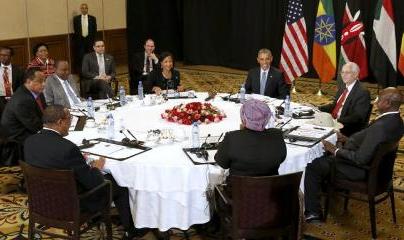Sudan’s FM & Norway envoy discuss situation in South Sudan
August 8, 2015 (KHARTOUM) – Sudan’s foreign minister, Ibrahim Ghandour discussed on Saturday with the visiting Norwegian envoy to the two Sudans Jens-Peter Kjemprud, the ongoing conflict in South Sudan and the regional and international efforts to restore peace and stability in the newborn state.

Fighting erupted in South Sudan in December 2013 when internal debate over democratic political transformation and reforms within the leadership of the ruling party turned violent, plunging the country into national crisis and civil war.
Sudan’s foreign ministry spokesperson, Ali al-Sadig, said Ghandour told the Norwegian envoy that Sudan’s interest requires presence of a stable, responsible and active government in South Sudan in order to achieve economic and social development for its people and maintain good relations with its neighbors.
Ghandour pointed that the most important step towards normalizing ties between Khartoum and Juba is through the implementation of the cooperation agreements signed between the two countries particularly those pertaining to the identification of zero line, determination of safe demilitarized border zone, joint border control force, border demarcation and the border points and crossings.
In September of 2012, both Sudan and South Sudan signed a series of cooperation agreements, which covered oil, citizenship rights, security issues, banking, border trade among others.
In March 2013, the two countries signed an implementation matrix for these cooperation agreements.
However, the implementation of the security agreements signed between Khartoum and Juba has stumbled since the fighting broke out in South Sudan leaving several outstanding issues.
The defence ministers of the two Sudans are expected to meet this month in Addis Ababa to discuss ways for settling joint issues agreed upon in the cooperation agreements.
South Sudan split from Sudan in 2011, six years after the signing of a peace deal that ended 22 years of bloody civil war.
MEETING WITH THE NUP
Meanwhile, the Norwegian envoy discussed with the opposition National Umma Party (NUP) ways for achieving peace in the two Sudans besides the recent developments in Sudan’s national dialogue.
According to a statement issued by the NUP on Saturday, the NUP deputy chairman, Meriam al-Mahdi, and secretary general, Sara Nugdalla, underscored the importance of holding a pre-dialogue meeting abroad in order to build trust and secure participation of all parties.
They demanded that the ruling National Congress Party (NCP) and the government stop bombing of civilians, allow humanitarian aid access for the needy population in the war-affected areas, allow public freedoms and release political detainees in order to show seriousness and commitment for a genuine dialogue.
The NUP officials said the NCP’s insistence on holding the dialogue according to its own agenda represents a real threat to stability in Sudan and the region, adding it would waste chances for achieving peace and political solution.
The political and armed groups opposed to the dialogue process refuse to join it under the current conditions asking to stop war and to ensure political freedoms.
Last April after the government’s rejection to participate in a pre-dialogue meeting, the opposition went to call for a new process under the auspice of the international community and brokered by the African Union Mediation team.
On Wednesday, the NUP leader, al-Sadiq al-Mahdi said the dialogue should begin outside the country with international guarantees and can then be moved inside the country after setting a meticulous roadmap, allowing the regime to participate in the dialogue without controlling it.
He further called on the chief mediator Thabo Mbeki, to announce the failure of his mediation and to inform the UN Security Council if he fails to persuade the regime to accept the opposition demands.
(ST)
